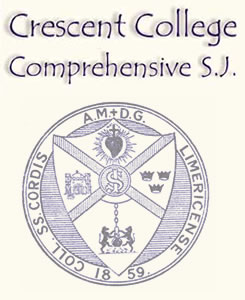Crescent College Comprehensive S.J.
| Crescent College | |
|---|---|
 |
|
| Location | |
|
Dooradoyle Limerick, County Limerick Ireland |
|
| Coordinates | 52°38′11″N 8°38′26″W / 52.63639°N 8.64056°WCoordinates: 52°38′11″N 8°38′26″W / 52.63639°N 8.64056°W |
| Information | |
| Type | Comprehensive |
| Motto |
Crescentes in Illo Per Omnia Quis Separabit Nos ("Growing in Him through all things" "Who will separate us") |
| Religious affiliation(s) | Catholic (Jesuit) |
| Founded | 1565 refounded 1859 & 1971 |
| Principal | Karen Fleming |
| Deputy Head | Sinead Mulcahy |
| Gender | Coeducational |
| Age | 12 to 18 |
| Enrolment | 950 |
| Slogan | Ad maiorem Dei gloriam |
| Website | Crescentsj.com |
Crescent College Comprehensive SJ, formerly known as the College of the Sacred Heart, is a secondary school located on 40 acres (160,000 m2) of parkland at Dooradoyle, Limerick, Ireland. The college is one of a number of Jesuit schools in Ireland. It had a long pre-history in Limerick before the acquisition of Crescent House in 1862.
The first Jesuit school in Ireland was established at Limerick in 1565 by the Apostolic Visitor of the Holy See David Wolfe, who had been sent to Ireland in 1563 by Pope Pius IV with the concurrence of the third Jesuit General, Diego Lainez. Wolfe, a Limerick man, had joined the Jesuits at Rome in 1550, had been appointed Rector of the College at Modena, and was later recommended to Pope Paul IV as Nuncio in the late 1550s, which was accepted.
Wolfe arrived in Ireland with another Irish Jesuit called 'Dermot' in January 1561, and had been charged with correcting "all manner of lapses from the church, and chiefly heresies and schismatical faults", and also to set up Grammar Schools. By 1565 he had established the first Counter-Reformation school at Limerick, which opened at Castle Lane, and was entrusted to the Society of Jesus. This establishment at Limerick was one of the first educational missions of the Society of Jesus, and pre-dated the Jesuit missions to South America by approximately ten years.
Wolfe delegated the foundation of the school to another Jesuit Scholastic, Edmund Daniel. Despite external setbacks initially, the Limerick school flourished, and in 1565 the City Council decided that the masters should be paid an annual salary of ten pounds, but this money was not accepted as it was to be raised as a levy on ships entering and leaving the port. It was therefore decided that the education offered should be free, based only on voluntary contributions, very much in the spirit of Ignatius's Roman College founded 14 years before, where no fee was requested from pupils.
William Good was proposed, with Primate Richard Creagh's approval, as rector of a Catholic university foundation in Ireland, which was intended to be established at Limerick. Good had been a fellow of Corpus Christi College, Oxford, and late headmaster of Wells Grammar School, under Queen Mary I. He had abandoned a career in the English Church, having been lately a Canon at Wells Cathedral, but declined to keep communion with the Anglican Church, re-established after Elizabeth's accession in 1562. Given the political situation in Ireland, Archbishop Creagh's plans for a Catholic university had to be delayed and instead Fr Good joined Edmund Daniel teaching at the Limerick grammar school. A number of Good's reports survive in the Jesuit archives at Rome and he records an early example of a school play in Ireland, which was performed on the Feast of St John in 1566. He also makes reference to the curriculum offered and students – who he described as being piously inclined – were first instructed to read, and progressed to read selected letters of Cicero and other classical texts in Latin. The students copied all the works, as there were no books, and they studied catechism in English, or in Latin for the Irish speakers. There were no holidays at the school, but boys were withdrawn by their parents at harvest time. Classes took place in very confined space at Castle Lane in the City and demand meant that pupils could only attend class in rotation.
...
Wikipedia
